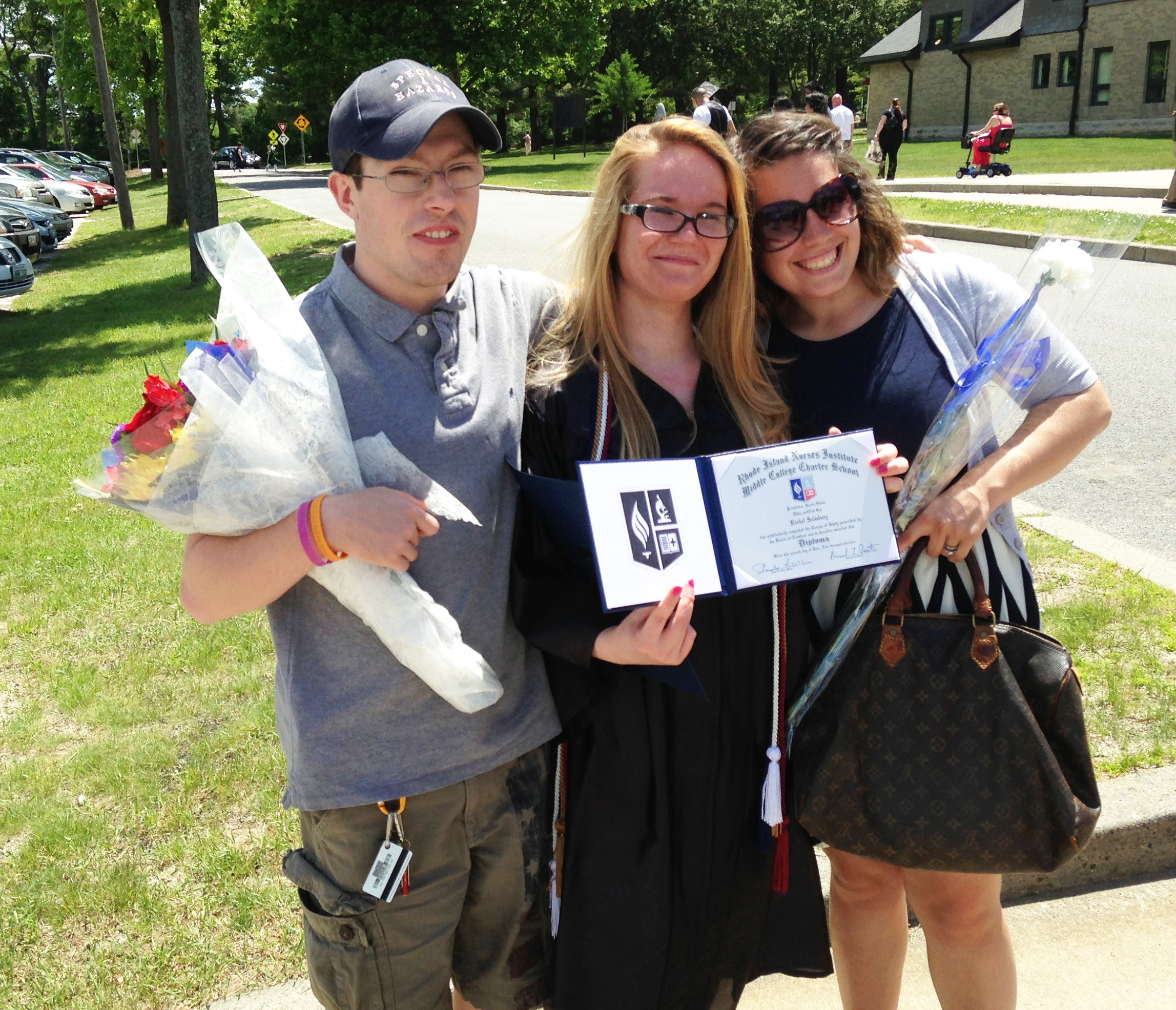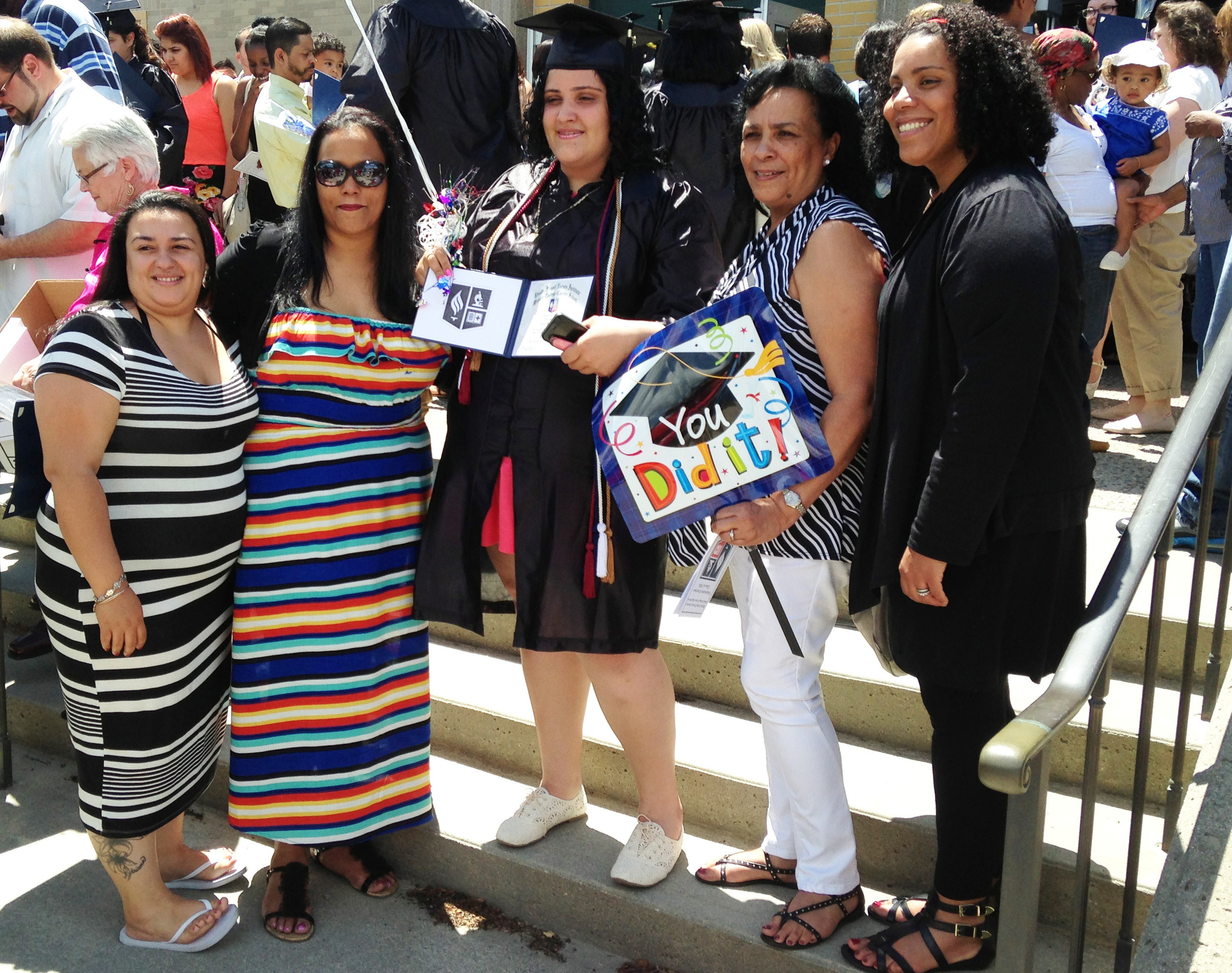Nursing charter school graduates its first class
Disruptive, innovative model of education celebrates its success, with all 54 graduates going to college
PROVIDENCE – Did you feel a powerful – but positive – disruption in the force on Saturday afternoon, June 7?
The positive vibrations were emanating from John and Lila Sapinsley Hall at Rhode Island College, where the first class of 54 students at the R.I. Nurses Institute Middle College Charter High School [RINI-MC] held their graduation exercises.
It was a loud, joyous, boisterous, exhilarating occasion – as the auditorium frequently erupted in cheers, a call-and-response of vocal support back and forth between the graduates, the family and friends that filled the hall, and the faculty on stage.
The graduates – pioneers all – had attended the four-year school – 10th, 11th, 12th and 12+ grade – in the only charter school of its kind in Rhode Island or the nation, dedicated to the nursing profession.
Every graduate in the first class of 2014 – 100 percent – will be going to college; many will be the first ones in their family ever to attend college – many to four-year nursing programs at Rhode Island College and the University of Rhode Island, among others.
Maria Jesus Mercado, the class salutatorian, was one of four students to receive a scholarship in honor of Nancy K. Hirst – full tuition next year at Rhode Island College.
Pamela L. McCue, RINI’s CEO, saluted the graduates as “trail blazers” who had traveled together through uncharted territory and now had arrived as confident, empathetic adults on their career path in health care – a future world that will be shaped in large part by nurses.
The graduates have been launched toward a successful career in nursing – what Michael J. Paruto, the chairman of the RINI Board of Trustees, called “the number-one career path in Rhode Island, the number-one career path in the region, and the number-one career path in the nation.”
Paruto, capturing the festive mood, began his remarks by taking a selfie with the graduates.
The graduates were “a class of distinction, the alpha class,” as keynote speaker Assistant U.S. Attorney Richard Rose named them, sharing his personal stories of overcoming obstacles in his own life, urging them to work hard and persevere and to remember that “love is the most powerful force in the universe.”
Manuella Nardolillo, the valedictorian, proudly said in her address: “We’re not only a school, we’re a community, a second home.”
Disruptive innovation
The success of RINI-MC’s model is what Paruto called “disruptive innovation,” disrupting the education model by breaking out of the traditional restraints of four-year high school and fashioning a program that combines high school with an extra, college-level year – 12+ – in order to better prepare students for a career path.
How successful is the model? Next year, the leaders of the RINI announced that they are planning to establish a similar nursing charter school in Florida.
As detailed in the Oct. 7 issue of ConvergenceRI, “Building a local talent pipeline for nurses in a patient-centric world,” the goal is to provide the academic foundation for local Rhode Island students to continue in college and pursue a four-year degree in nursing – and the pathway to a good-paying career in health care. [See link to story below.]
Unlike traditional high school, the middle college is run much like a college program, with students treated as young adults – and, in turn, expected to behave as young adults.
The results to date have been impressive. The innovative school, straddling the learning ground between high school and college, has successfully closed the achievement gap – and has been rated one of the top 10 high schools by RI-CAN in 2013. Students exceeded statewide averages in 2012 for proficiency in reading by 8 percent and for proficiency in writing by 22 percent.
As Jayson Pedro Albuerme, who had come to RINI from Cranston East High School, told ConvergenceRI in October: “In this school, they give you the motivation to succeed and move on. We’re more of a family than a student body.” The classroom experience, with smaller class sizes, allowed for more one-on-one interactions with teachers.
To build the local talent pipeline
Much attention has been focused on how Rhode Island can better prepare its students to become part of the talent pipeline for workforce needed for the state’s economic prosperity.
From STEM to STEAM, from improved performances on standardized testing to stricter graduation requirements, there have been many solutions proposed – but the fundamental changes that have helped make RINI-MC a success, with its four-year program that includes a 12+ year, have not yet been made part of the equation.
For instance, R.I. Speaker of the House Nicholas Mattiello is championing new legislation, developed in partnership with the R.I. Department of Education and the R.I. Public Expenditure Council, to revamp the state’s career and technical education options. “If you want to change the business climate in Rhode Island, a qualified work force is one of the key pieces,” he said recently, reported by Kate Bramson in The Providence Journal.
Mattiello, John Simmons, RIPEC’s executive director, who is backing the proposed legislation, and even Deborah Gist, head of the R.I. Department of Education, might do well to pay heed to what Nardolillo had to say about her education and the opportunities it presented.
“One of the greatest strengths of the Rhode Island Nurses Institute Middle College is not only does it ease students into preparing for college, but it also creates opportunity,” she said. “I’ve had the opportunity to attend national conferences and participate in so many other professional nursing experiences that I never would have been able to otherwise.”








